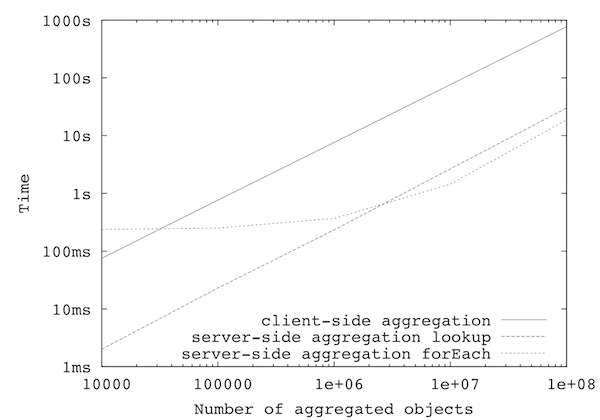Purpose
The intention of this page is to present experiments with non-CRUD data operations.
Aggregation Operation
An aggregation operations adds up the values of a number of objects. When executing such an operation in RAMCloud three questions, among others, are of interest:
- Where to execute the aggregation operation (client or server side)?
- How to describe the range of objects which should be included in the operation?
- How to interpret the objects themselves?
The experiments below are centered around the question about where to execute the operation. Three different scenarios are implemented:
- Client-side aggregation: The client-side aggregation is implemented in a way that client request a number of objects one by one where each object contains one integer value. Consequently, a "Read-RPC" gets invoked for every object and the client locally computes the sum.
- Server-side aggregation via hashtable lookup: A range of keys is passed to the server and the server performs a lookup in its own hash table for every object. Again, each object contains a single integer which gets added up (as shown in Listing 1). Once the aggregation is done, the resulting sum is sent back to the server via RPC.
- Server-side aggregation via hashTable forEach: The hash table in the MasterServer offers a forEach method that iterates over all object contained in the hash table. A callback can be registered to that method which is shown in Listing 2.
for(uint64_t i = 0; i < range; ++i)
{
LogEntryHandle handle = objectMap.lookup(tableId, i);
const Object* obj = handle->userData<Object>();
int *p;
p = (int*) obj->data;
sum += (uint64_t)*p;
}
/**
* Aggregation Callback
*/
void
aggregateCallback(LogEntryHandle handle, uint8_t type,
void *cookie)
{
const Object* obj = handle->userData<Object>();
MasterServer *server = reinterpret_cast<MasterServer*>(cookie);
int *p;
p = (int*) obj->data;
server->sum += (uint64_t)*p;
}
Benchmarking
The benchmarks below have been executed using a separate server for client and server connected via Infiniband. After each run, the equality of the client-side and server-side calculated sum has been checked. The benchmarks allow the following conclusions:
- By executing the aggregation on the server-side a performance improvement up to a factor 50 can be seen.
- When traversing a set of distinct objects, retrieving a single object takes about 7-8?s (or a RAMCloud client can request about 130.000 objects/sec from a single RAMCloud server).
- Invoking the hashTable forEach method comes at a penalty of around 200 ms (presumably to due the Callback).
- When traversing large amounts of objects the forEach method is 1.6-1.8x faster that looking up each individual object.
#number of objects |
client-side aggregation |
server-side aggregation |
server-side aggregation |
|---|---|---|---|
10.000 |
75 ms |
2 ms |
238 ms |
100.000 |
766 ms |
23 ms |
251 ms |
1.000.000 |
7604 ms |
233 ms |
369 ms |
10.000.000 |
76515 ms |
2662 ms |
1444 ms |
100.000.000 |
770761 ms |
30049 ms |
18752 ms |
